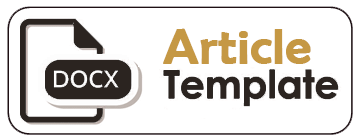Pengembangan Bi’ah Lughawiyah Maharah Al-Kalam Bahasa Arab bagi Mahasiswa dan Dosen di Prodi PBA UNM
Abstract
Abstract: This article discusses the development of bi’ah lughawiyah as a strategy to strengthen maharah al-kalam for students and lecturers of the Arabic Language Education Study Program (PBA) of Makassar State University (UNM). The background of this research is the need to create a conducive Arabic language environment to encourage communicative speaking skills, both in academic and non-academic contexts. The method used is a descriptive conceptual approach with analysis and enrichment of initial observation results in the PBA UNM environment. The results of the study indicate that the development of bi’ah lughawiyah is effective if designed through three ecological layers: 1) the micro level in the form of task-based language teaching in the classroom and the use of targeted translanguaging, 2) the meso level in the form of co-curricular activities such as Arabic Day, debate clubs, and Lughah Corner, and 3) the macro level in the form of study program policies that regulate the use of Arabic among lecturers. This model is able to improve students’ fluency, accuracy, and confidence, while strengthening lecturers’ competence. This article emphasizes that the development of bi'ah lughawiyah is not only cultural, but also strategic in building an academic culture and developing the maharah al-kalam of Arabic at PBA UNM.
Downloads
References
Raudatussolihah, Baiq, Ali Fathurrahman dkk. (2025). "Optimalisasi Kemahiran Qira'ah Melalui Daurah Nahwiyah Digital Berbasis Teknologi Interaktif Bagi Mahasiswa PBA UNM". ALAMTANA (Jurnal Pengabdian Masyarakat UNW Mataram), Vol. 6 (1). 2722-6751, https://ejournalunwmataram.org/index.php/jaltn/article/view/2445
Lihat Darussalam Gontor Team, Implementation of Bi’ah Lughawiyah in Improving Mahārah Kalām, Mantiqu Tayr: Journal of Arabic Language, 2(2), 2022, hlm. 174–184.
N. Hidayah, dkk., “Bī’ah Lughawiyah Programs in Arabic Language Learning to Improve Students’ Arabic Speaking Skills,” Ta’lim al-‘Arabiyyah, 2023.
A. Al-Sharhan, dkk., “Challenges in Listening and Speaking Skills for Arabic Language Teacher Education Students,” ERIC (EJ1446764), 2024.
A. Nugroho, dkk., “Virtual Socio-Cultural Collaborative Learning for EFL Speaking,” SSRN Working Paper, 2025.
Y. Wang & J. Li, “Task-Based Language Teaching: A Systematic Review of Research on Speaking Proficiency,” English Language Teaching, 2024.
A. Zakaria, dkk., “Translanguaging Practices among English, Indonesian, and Arabic in Indonesian Tafsir Classrooms,” Indonesian Journal of Applied Linguistics, 2025.
Creswell, J. W., & Poth, C. N. (2018, edisi terbaru digunakan 2023). Qualitative Inquiry and Research Design: Choosing Among Five Approaches. Los Angeles: Sage Publications.
Sugiyono. (2020). Metode Penelitian Kualitatif: Untuk Penelitian yang Bersifat Eksploratif, Interaktif, dan Konstruktif. Bandung: Alfabeta.
Raudatussolihah, Baiq, Nurul Ilmi Rasjusti, dkk. (2025). "Optimalisasi Kemahiran Qira'ah Melalui Daurah Nahwiyah Digital Berbasis Teknologi Interaktif Bagi Mahasiswa PBA UNM". ALAMTANA (Jurnal Pengabdian Masyarakat UNW Mataram), Vol. 6 (1). 2722-6751, https://ejournalunwmataram.org/index.php/jaltn/article/view/2448
Rahardjo, M. (2021). “Triangulasi dalam Penelitian Kualitatif.” Jurnal Penelitian Humaniora, 22(1), 15–25.
Miles, M. B., Huberman, A. M., & Saldaña, J. (2019). Qualitative Data Analysis: A Methods Sourcebook (Edisi ke-4). California: Sage.
Moleong, L. J. (2021, edisi revisi). Metodologi Penelitian Kualitatif. Bandung: PT Remaja Rosdakarya.
Copyright (c) 2025 Baiq Raudatussolihah, Ali Fathurrahman, Masita Taufiqi Kholida, Ahmad Rais. TM, Dyah Adila Perdana

This work is licensed under a Creative Commons Attribution-NonCommercial-ShareAlike 4.0 International License.

.jpg)




